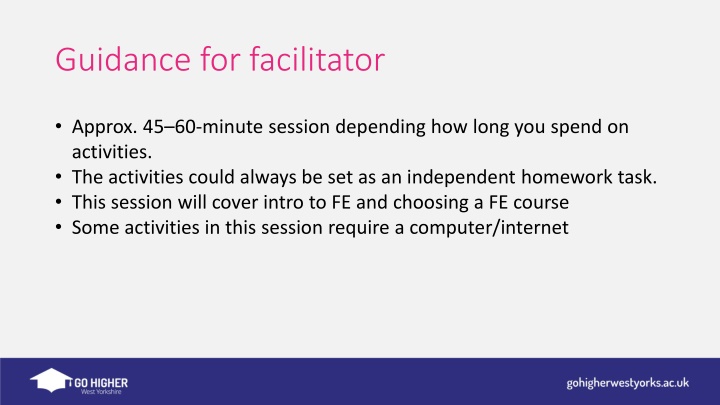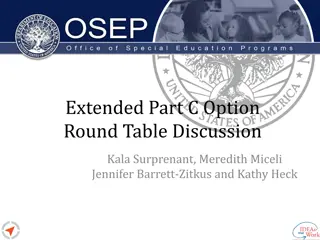
Choosing the Right Further Education Course: A Comprehensive Guide
Explore the world of further education with this comprehensive guide that covers an introduction to FE, choosing the right course, learning styles assessment, post-16 qualifications, A-Levels, vocational subjects, and more. Engage in interactive activities and valuable resources to make informed decisions about your educational journey.
Download Presentation

Please find below an Image/Link to download the presentation.
The content on the website is provided AS IS for your information and personal use only. It may not be sold, licensed, or shared on other websites without obtaining consent from the author. If you encounter any issues during the download, it is possible that the publisher has removed the file from their server.
You are allowed to download the files provided on this website for personal or commercial use, subject to the condition that they are used lawfully. All files are the property of their respective owners.
The content on the website is provided AS IS for your information and personal use only. It may not be sold, licensed, or shared on other websites without obtaining consent from the author.
E N D
Presentation Transcript
Guidance for facilitator Approx. 45 60-minute session depending how long you spend on activities. The activities could always be set as an independent homework task. This session will cover intro to FE and choosing a FE course Some activities in this session require a computer/internet
An introduction to further education: Part 2
Activity: Activity: Page 32 Type Arden University Learning Styles into your search engine to find the quiz, which is called What type of learner are you? (What type of learner are you? (arden.ac.uk))
Activity: Page 33 Now head over to the UCAS website (www.ucas.com). In the search box, type Post 16 qualifications you can take . Click on the heading of the same name, and this will give you the chance to read about the different options in more detail.
T-Levels A Levels Types of Courses Types of Courses BTECs Apprenticeships
A Levels What are A Levels? What are A Levels? A Levels are academic subject-based qualifications that can lead to university, an apprenticeship or work. Students normally study three or four A Levels and are assessed using exams. You ll find A Levels in traditional subjects such as English or Biology, but also courses you may not have studied at GCSE, like Psychology or Law. What grades to I need to achieve A Levels? What grades to I need to achieve A Levels? To be able to study A Levels, you normally need five GCSEs at Grades 9 to 4, including English and Maths. Some subjects will require GCSE grades in specific subjects and these might be different at different providers. If you re thinking about going to university, some higher education courses also ask for specific A Levels or combinations of A Levels.
Vocational Subjects What are Vocational Qualifications? What are Vocational Qualifications? Vocational courses are designed to help you learn in a practical way about a specific job area. They can help you get the skills you need to kickstart your career or progress into higher education. BTECs and other Level 3 vocational qualifications prepare students and allow them to progress onto a range of courses in higher education Types of vocational qualifications: Types of vocational qualifications: BTECs Apprenticeships T-Levels
BTECs What are BTECs? What are BTECs? BTECs offer practical skills, as well as relevant work experience in some circumstances. There are usually less exams and a wider variety of assessment methods than you might find with A Levels. If you study BTECs, you may be assessed using practical tasks, observations and work-based assessments. You may also have to write some essays during a BTEC course. Some schools, sixth forms and colleges let students study BTECs alongside A Levels. There are lots of subjects available from Health and Social Care to Motor Vehicle Technology.
Apprenticeships What is an Apprenticeship? What is an Apprenticeship? Apprenticeships combine practical training in a job with study. As an apprentice you ll, be an employee earning a wage and work alongside experienced staff. Most apprentices spend around 80% of their time in the workplace and 20% studying. Completing studies alongside work mean that being able to manage your time well is a must! Colleges and Universities treat apprentices the same as other part-time students. They have access to services such as student support, library and social activities. There is a wide variety of apprenticeships from nursing to zoology. Check entry requirements carefully as they can often depend on the level and sector.
Activity: Page 39 You can find out what apprenticeships are on offer in your local area by searching find an apprenticeship Gov.uk You don t have to include a key word , just put your postcode in and how far you d realistically want/be able to travel
T-Level What are T Levels? What are T Levels? T-Levels are a new and exciting type of qualifications. They aim to give students the knowledge and practical experience to get jobs that require specific skills. T-Levels are designed in partnership with businesses and offer students the chance to undertake work placements as part of their course. This could be a good option for you if you know what job or industry you want to work in. T-Levels are still very new and offered in the subject areas below: Education and childcare Digital Production, design and development Design, surveying and planning for construction T-Levels will be recognised by higher education providers!
Final thoughts... Do your research and make sure your chosen path is the right one for you! It can be hard to put 100% effort into something you don t enjoy, so try and think of subjects you really enjoy and explore where they could take you. Remember to think about how you like to learn and does this suit you, this could influence what course and careers are right for you. Everyone is different, what s right for your friend may not be right for you. Ask yourself these 3 questions: What do I enjoy doing? What would I like to do? What do I want from MY life?
Applying to Further Education The FE application process The FE application process 1. Find a 6th form, college, or training provider 2. Research your course options 3. Research your travel options 4. Attend an open event 5. Additional costs 6. Complete your application form 7. Attend an interview 8. Wait to hear whether you ve been offered a place
Activity: Page 46 Using Careerpilot or Google Maps, find two FE providers in your area Find out how far away the providers are What methods of transport are available to you? How long would it take you to get to them? Write down 3 questions you could ask at an open day
College interviews You ll attend interviews for lots of different things throughout your life! Different types of You ll attend interviews for lots of different things throughout your life! Different types of interviews need different skills interviews need different skills We often think of interviews as being for the benefit of the interviewer. But interviews are also a great opportunity for you to talk about yourself and your future ambitions, and to find out more about the course and college life. Preparation is key for interviews. The best way to prepare is to answer some practice questions!
Activity: Page 48 Have a think about a college and course you might be interested in, and answer the following Have a think about a college and course you might be interested in, and answer the following questions questions Why have you decided to apply to us? What do you want to gain from the course? Where do you see yourself in five years? What do you think your strengths and weaknesses are? Do you have any questions for me?

